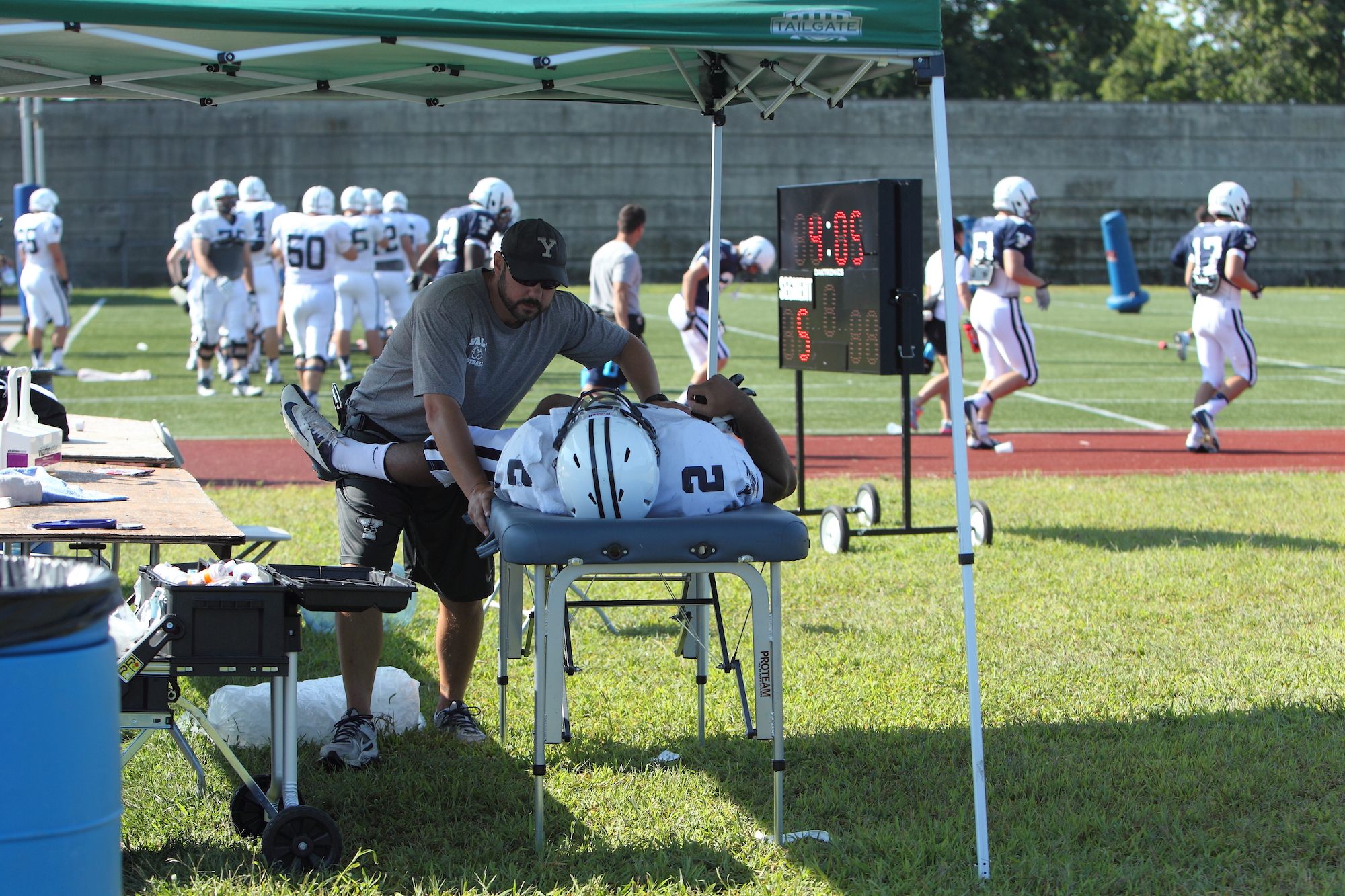With no competition, responsibilities evolve for Yale’s athletic trainers
Trainers’ responsibilities have changed this year to support athletes returning from stretches of inactivity and assist previously infected athletes by setting them up with physiological exams and EKG tests.

Yale Athletics
With the Ivy League canceling competition this year, Yale’s athletic training staff has assumed an evolved set of responsibilities, designing individualized programs catered to athletes returning to campus after months of inactivity and assisting with COVID-19 education and mitigation strategies.
In a regular academic school year, athletic trainers mainly offer medical coverage to student-athletes, with their primary function being the assessment and treatment of musculoskeletal and orthopaedic injuries, according Yale’s Head Athletic Trainer Jay Cordone. Treating injuries that occur during intense practices and competitions is a process that begins during preseason and continues throughout the academic year. However, without athletic competition, trainers’ responsibilities have changed this year to adjust to the ways student-athletes have seen their athletic experiences and routines shift since the beginning of the pandemic.
“Collaborating with our sports performance team, we worked to safely reintegrate student-athletes into their more traditional training plans with the goal of preventing injury and enhancing performance,” Cordone wrote in an email to the News. “Since the start of the pandemic in March, I have been involved in discussions to determine how Yale’s student-athletes can safely return to in-person training for their sport while also working with the Ivy League and Yale’s campus partners to determine how a safe return to competition could be possible.”
Among the additional COVID-19 mitigation responsibilities with which trainers have been tasked, the staff has helped provide additional entrance screening outside athletic facilities. Cordone wrote athletes reach out to athletic trainers with COVID-19 related symptoms or concerns, which include questions surrounding symptoms and contact tracing. Recently, he said athletes have been reaching out with questions about vaccine appointments and scheduling.
In the event that a student-athlete tests positive for COVID-19, athletic trainers work with Yale’s Athletic Medicine team to perform cardiological checkups and plan a five-phased return to training. Before they are allowed to continue training, Cordone said athletes who have received a positive result have to undergo a physiological exam, which includes a repeat electrocardiogram, or EKG. Yale Health handles the administration of the exam.
“[The physiological exam] includes a repeat EKG (all SAs [student-athletes] have an EKG at Yale prior to sports participation), an echocardiogram and a troponin test,” Cordone wrote. “This information is reviewed by Yale’s sports cardiologists and team physicians to determine whether they can start a five-phased return to sport protocol or whether they will need additional testing.”
Beyond dealing with recovery from the SARS-CoV-2 virus itself, some trainers have noticed that they are discussing mental health more with athletes.
In an email to the News, Alexandra Bakovic, Yale’s assistant athletic trainer for volleyball, gymnastics and women’s crew, wrote that while physical concerns are similar to ones she has encountered in past years, there has been an “increased focus on mental health and support.” She added that instead of spending the majority of her time traveling and covering competitions, she has mainly been spending time in patient care, which is not typical.
Cordone, who covers the football and men’s lacrosse team, wrote that even though staff have managed fewer injuries this year given the absence of games, athletes on the teams with which he works have suffered a different range of physical injuries that are often related to players getting back into their sport after time away from intense practice.
Both Cordone and Bakovic wrote that their weekday schedules have largely stayed the same compared to a normal year, but they find themselves with more time on the weekends, when they would usually be on the sidelines covering competitions, according to Cordone.
Cordone has been able to spend more time with his wife and dogs, and Bakovic continues to “stay busy” through weightlifting classes and home projects.
“A major take away this year has been that I can take time for myself,” Bakovic wrote. “By making sure I am in the best mental and physical shape, we can be there for our student-athletes’ needs.”
As of Monday, Yale Athletics remains in Phase II of the Ivy League’s plan for the resumption of athletic activities.
Nicole Rodriguez | nicole.rodriguez.nr444@yale.edu







